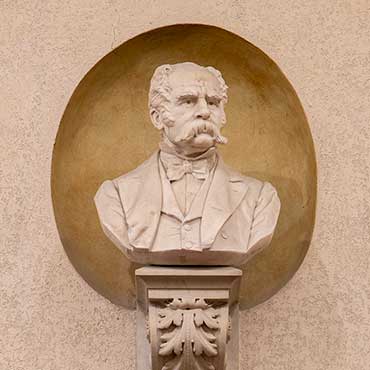Bucchia was born in Brescia in 1810, a nephew on his mother’s side of the well-known engineer Pietro Paleocapa. He attended high-school in Venice, then graduated in 1831 as an architectural engineer at the Accademia di belle arti in Padua. Two years later he took up civil engineering under the guidance of his uncle, working in hydraulics and geodesy and as a supervisor of the construction of roads. He was awarded the chair of civil architecture and hydraulics at the School for Engineers and Architects at the University of Padua and became a full professor in 1845. Although he was mainly concerned with public water works, he also dealt with bridges, roads, supporting walls and embankments as well as railways, complementing his theoretical studies with work in the field. Together with Domenico Turazza and Alberto Cavalletto, Bucchia was a member of the committee created to save Verona from flooding from the Adige, and he was also involved in the lagoon of Venice, including work on the port of Lido and the movement of the tides.
In the political field Bucchia took part in the struggles of the Risorgimento and was one of the ruling class of the new Italy. In the First War of Independence he was in charge of a volunteer battalion of those students who had been defeated at Sorio. Following the fall of Padua he had to retreat to Venice, where, under the direction of the provisional government to which his uncle belonged, he fought as a captain in the corps of engineers. With the restoration of the Austrian government he gave up teaching until 1851. After Veneto became part of Italy, Bucchia was elected to Parliament in four legislatures and from 1883 he became a senator. Although he was more than a generation older than Favaro and did not have a particularly close relationship with him, Gustavo Bucchia was one of the leading figures in the Padua School of Engineering, where Antonio Favaro was firstly a student and then a lecturer. Together with Favaro and his father-in-law Domenico Turazza he was a fellow of the Istituto Veneto; and it was Turazza himself who commemorated him in one of the meetings following his death that struck him down in 1889 at Resiutta, in the Province of Udine.


